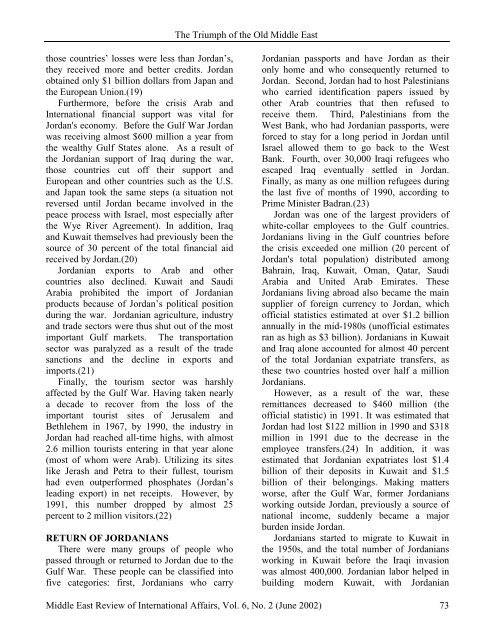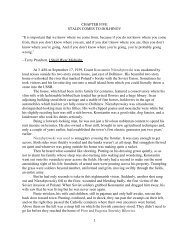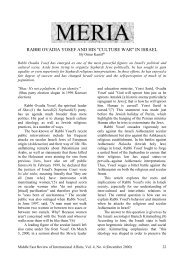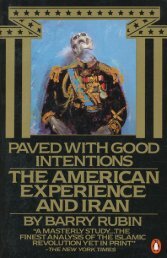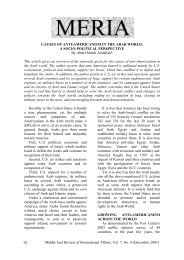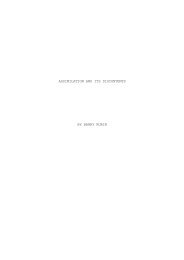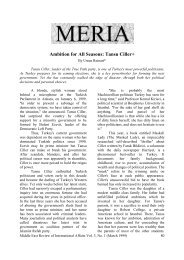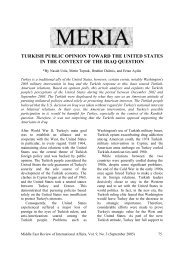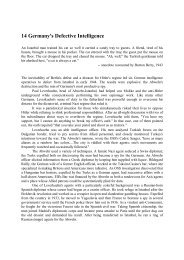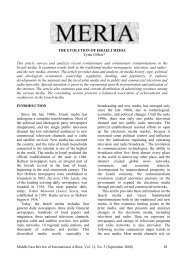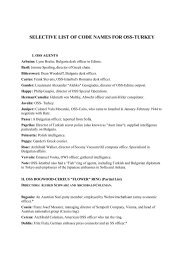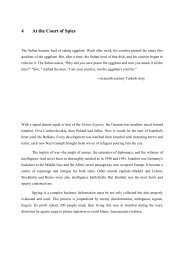on the jordanian economy - GLORIA Center
on the jordanian economy - GLORIA Center
on the jordanian economy - GLORIA Center
Create successful ePaper yourself
Turn your PDF publications into a flip-book with our unique Google optimized e-Paper software.
The Triumph of <strong>the</strong> Old Middle Eastthose countries’ losses were less than Jordan’s,<strong>the</strong>y received more and better credits. Jordanobtained <strong>on</strong>ly $1 billi<strong>on</strong> dollars from Japan and<strong>the</strong> European Uni<strong>on</strong>.(19)Fur<strong>the</strong>rmore, before <strong>the</strong> crisis Arab andInternati<strong>on</strong>al financial support was vital forJordan's ec<strong>on</strong>omy. Before <strong>the</strong> Gulf War Jordanwas receiving almost $600 milli<strong>on</strong> a year from<strong>the</strong> wealthy Gulf States al<strong>on</strong>e. As a result of<strong>the</strong> Jordanian support of Iraq during <strong>the</strong> war,those countries cut off <strong>the</strong>ir support andEuropean and o<strong>the</strong>r countries such as <strong>the</strong> U.S.and Japan took <strong>the</strong> same steps (a situati<strong>on</strong> notreversed until Jordan became involved in <strong>the</strong>peace process with Israel, most especially after<strong>the</strong> Wye River Agreement). In additi<strong>on</strong>, Iraqand Kuwait <strong>the</strong>mselves had previously been <strong>the</strong>source of 30 percent of <strong>the</strong> total financial aidreceived by Jordan.(20)Jordanian exports to Arab and o<strong>the</strong>rcountries also declined. Kuwait and SaudiArabia prohibited <strong>the</strong> import of Jordanianproducts because of Jordan’s political positi<strong>on</strong>during <strong>the</strong> war. Jordanian agriculture, industryand trade sectors were thus shut out of <strong>the</strong> mostimportant Gulf markets. The transportati<strong>on</strong>sector was paralyzed as a result of <strong>the</strong> tradesancti<strong>on</strong>s and <strong>the</strong> decline in exports andimports.(21)Finally, <strong>the</strong> tourism sector was harshlyaffected by <strong>the</strong> Gulf War. Having taken nearlya decade to recover from <strong>the</strong> loss of <strong>the</strong>important tourist sites of Jerusalem andBethlehem in 1967, by 1990, <strong>the</strong> industry inJordan had reached all-time highs, with almost2.6 milli<strong>on</strong> tourists entering in that year al<strong>on</strong>e(most of whom were Arab). Utilizing its siteslike Jerash and Petra to <strong>the</strong>ir fullest, tourismhad even outperformed phosphates (Jordan’sleading export) in net receipts. However, by1991, this number dropped by almost 25percent to 2 milli<strong>on</strong> visitors.(22)RETURN OF JORDANIANSThere were many groups of people whopassed through or returned to Jordan due to <strong>the</strong>Gulf War. These people can be classified intofive categories: first, Jordanians who carryJordanian passports and have Jordan as <strong>the</strong>ir<strong>on</strong>ly home and who c<strong>on</strong>sequently returned toJordan. Sec<strong>on</strong>d, Jordan had to host Palestinianswho carried identificati<strong>on</strong> papers issued byo<strong>the</strong>r Arab countries that <strong>the</strong>n refused toreceive <strong>the</strong>m. Third, Palestinians from <strong>the</strong>West Bank, who had Jordanian passports, wereforced to stay for a l<strong>on</strong>g period in Jordan untilIsrael allowed <strong>the</strong>m to go back to <strong>the</strong> WestBank. Fourth, over 30,000 Iraqi refugees whoescaped Iraq eventually settled in Jordan.Finally, as many as <strong>on</strong>e milli<strong>on</strong> refugees during<strong>the</strong> last five of m<strong>on</strong>ths of 1990, according toPrime Minister Badran.(23)Jordan was <strong>on</strong>e of <strong>the</strong> largest providers ofwhite-collar employees to <strong>the</strong> Gulf countries.Jordanians living in <strong>the</strong> Gulf countries before<strong>the</strong> crisis exceeded <strong>on</strong>e milli<strong>on</strong> (20 percent ofJordan's total populati<strong>on</strong>) distributed am<strong>on</strong>gBahrain, Iraq, Kuwait, Oman, Qatar, SaudiArabia and United Arab Emirates. TheseJordanians living abroad also became <strong>the</strong> mainsupplier of foreign currency to Jordan, whichofficial statistics estimated at over $1.2 billi<strong>on</strong>annually in <strong>the</strong> mid-1980s (unofficial estimatesran as high as $3 billi<strong>on</strong>). Jordanians in Kuwaitand Iraq al<strong>on</strong>e accounted for almost 40 percentof <strong>the</strong> total Jordanian expatriate transfers, as<strong>the</strong>se two countries hosted over half a milli<strong>on</strong>Jordanians.However, as a result of <strong>the</strong> war, <strong>the</strong>seremittances decreased to $460 milli<strong>on</strong> (<strong>the</strong>official statistic) in 1991. It was estimated thatJordan had lost $122 milli<strong>on</strong> in 1990 and $318milli<strong>on</strong> in 1991 due to <strong>the</strong> decrease in <strong>the</strong>employee transfers.(24) In additi<strong>on</strong>, it wasestimated that Jordanian expatriates lost $1.4billi<strong>on</strong> of <strong>the</strong>ir deposits in Kuwait and $1.5billi<strong>on</strong> of <strong>the</strong>ir bel<strong>on</strong>gings. Making mattersworse, after <strong>the</strong> Gulf War, former Jordaniansworking outside Jordan, previously a source ofnati<strong>on</strong>al income, suddenly became a majorburden inside Jordan.Jordanians started to migrate to Kuwait in<strong>the</strong> 1950s, and <strong>the</strong> total number of Jordaniansworking in Kuwait before <strong>the</strong> Iraqi invasi<strong>on</strong>was almost 400,000. Jordanian labor helped inbuilding modern Kuwait, with JordanianMiddle East Review of Internati<strong>on</strong>al Affairs, Vol. 6, No. 2 (June 2002) 73


